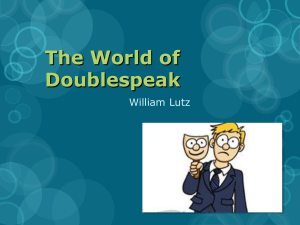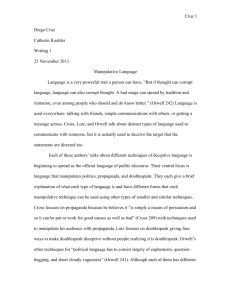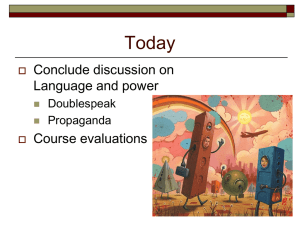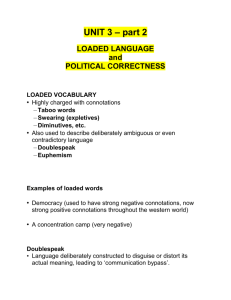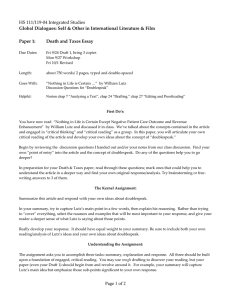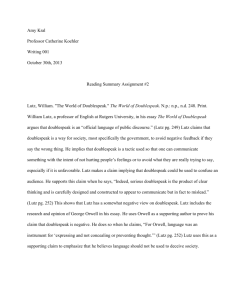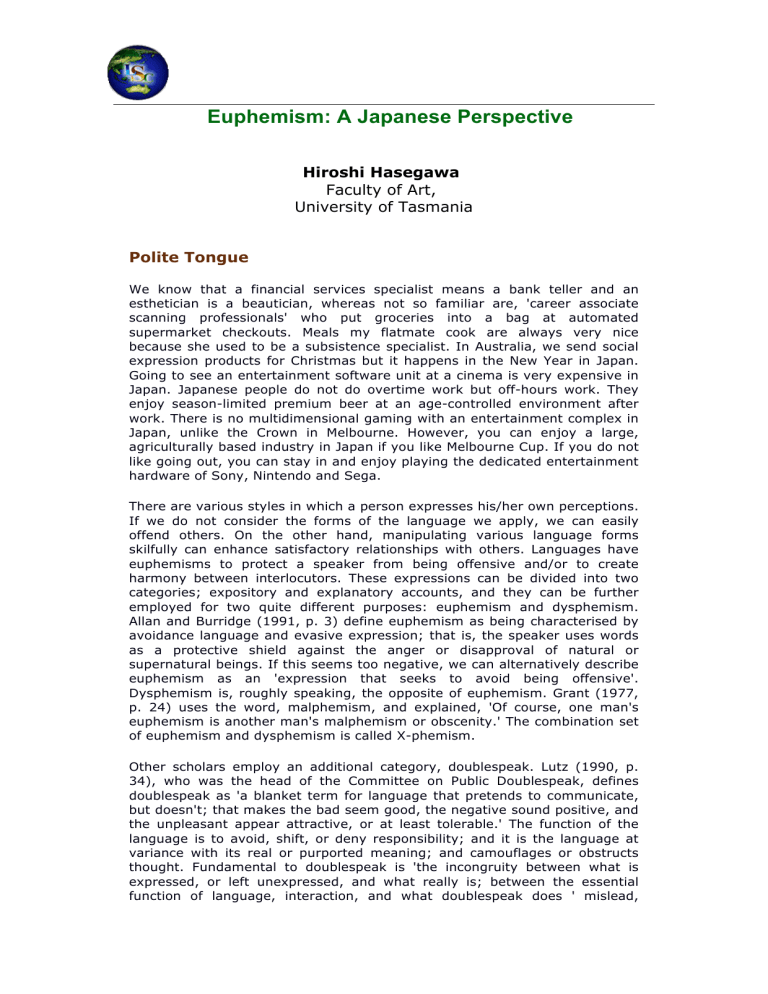
! Euphemism: A Japanese Perspective ! Hiroshi Hasegawa Faculty of Art, University of Tasmania Polite Tongue We know that a financial services specialist means a bank teller and an esthetician is a beautician, whereas not so familiar are, 'career associate scanning professionals' who put groceries into a bag at automated supermarket checkouts. Meals my flatmate cook are always very nice because she used to be a subsistence specialist. In Australia, we send social expression products for Christmas but it happens in the New Year in Japan. Going to see an entertainment software unit at a cinema is very expensive in Japan. Japanese people do not do overtime work but off-hours work. They enjoy season-limited premium beer at an age-controlled environment after work. There is no multidimensional gaming with an entertainment complex in Japan, unlike the Crown in Melbourne. However, you can enjoy a large, agriculturally based industry in Japan if you like Melbourne Cup. If you do not like going out, you can stay in and enjoy playing the dedicated entertainment hardware of Sony, Nintendo and Sega. There are various styles in which a person expresses his/her own perceptions. If we do not consider the forms of the language we apply, we can easily offend others. On the other hand, manipulating various language forms skilfully can enhance satisfactory relationships with others. Languages have euphemisms to protect a speaker from being offensive and/or to create harmony between interlocutors. These expressions can be divided into two categories; expository and explanatory accounts, and they can be further employed for two quite different purposes: euphemism and dysphemism. Allan and Burridge (1991, p. 3) define euphemism as being characterised by avoidance language and evasive expression; that is, the speaker uses words as a protective shield against the anger or disapproval of natural or supernatural beings. If this seems too negative, we can alternatively describe euphemism as an 'expression that seeks to avoid being offensive'. Dysphemism is, roughly speaking, the opposite of euphemism. Grant (1977, p. 24) uses the word, malphemism, and explained, 'Of course, one man's euphemism is another man's malphemism or obscenity.' The combination set of euphemism and dysphemism is called X-phemism. Other scholars employ an additional category, doublespeak. Lutz (1990, p. 34), who was the head of the Committee on Public Doublespeak, defines doublespeak as 'a blanket term for language that pretends to communicate, but doesn't; that makes the bad seem good, the negative sound positive, and the unpleasant appear attractive, or at least tolerable.' The function of the language is to avoid, shift, or deny responsibility; and it is the language at variance with its real or purported meaning; and camouflages or obstructs thought. Fundamental to doublespeak is 'the incongruity between what is expressed, or left unexpressed, and what really is; between the essential function of language, interaction, and what doublespeak does ' mislead, distort, deceive, inflate, circumvent, and obfuscate.' In Language, Appearance and Reality: Doublespeak in 1984, Lutz also advocates that there are at least 4 major dominants of doublespeak; 1) Euphemism is expressions that are designed to avoid a harsh or distasteful reality but becomes doublespeak when it is introduced to mislead or deceive, 2) Specialised language used in some particular field such as a trade, profession or similar group, called jargon, 3) Gobbledygook or bureaucratese and 4) Inflated language (1987, p. 382-383). While Allan and Burridge described the divergence between euphemism and dysphemism as opposite entities, euphemism, as defined by Lutz in euphemism dominant 1 above, is in fact only one aspect of doublespeak. Euphemism, dysphemism and doublespeak seem to have very analogous features, especially dysphemism and doublespeak. However, in fact, clear distinctions can be made. First is for X-phemism in which the speaker conveys his or her perspective to the audience and there is no intention to deceive. If you consider the receiver's feelings and avoid negative aspects toward the interlocutors' affection, it is euphemism. If it intentionally and/or unintentionally works negatively, the term is dysphemism. If locution, however, contains intention and motivation to mislead or deceive the audience, then the expression becomes doublespeak. Doublespeak is when the speaker pretends not to render the truth of the issue but to switch the locution intentionally and obfuscate the truth. It is the language which entraps you by concealing the truth. Therefore it cannot be categorised as similar to euphemism; instead it is closer to dysphemism. It must be stressed that unlike the intention in euphemism and dysphemism, there are no positive aspects to be switched by doublespeak because if there is, its' function would not exist in order to change the negatives to positives. The decision for this transmitting is usually associated with wide a range of contextual factors such as people's status, background information and so forth. In other words, the decision will be made by the way you view the object. X-phemism in Japanese Government English is a language which applies various X-phemistic locutions to diverse fields, especially in the bureaucracy. This is same in the Japanese context, too. How X-phemism and doublespeak are sociolinguistically associated with Japanese context is explained here. According to a ministry directed textbook published in 1982, the Japanese invasion of China in 1931 is the Japanese 'advance'. The annexation of Korea in 1910 also became an 'advance' of Japanese forces, and the establishment of a 'supervisory government'. Prohibiting the Korean language is 'education in the Japanese language', while Korean citizens who were forced to work for the Japanese military are called 'voluntary labourers'. There were thousands of young girls and women from Korea, China, Taiwan and the Philippines who were made to work as sexual slaves for the Japanese military, called jugun ianfu, 'military comfort women'. Governments excel in euphemism for manifest reasons. 'The intolerable somehow has to be made to seem tolerable ' and the technique for accomplishing that illusion is through a welter of either positive or bewildering words' (LaRocque 1998, p. 63). The Japanese government has never sent an official apology or said the word 'sorry' to the comfort women but instead says, 'We regret that there was an unfortunate history.' (And this is the similar situation with the Australian government, P.M. John Howard's administrative policy toward Aborigines, Australian natives.) In early 2001, the Japanese government once again refused to intervene in the authorisation of a junior high school history text on the above the WWII and describes 'a positive effect on south-east Asian nations, freeing them from Western rule' (An article in The Weekend Australian published on 31 March 1 April, 2001, p. 11). August 15, 1945 is not the day Japan lost the WWII; it is the day when the war ended. Article 9 of Japan's constitution declares that it will not possess war making capacity and renounce war completely so that we do not have a military, despite the fact that Jieitai, Japanese Self-Defence Forces possesses a quarter of million soldiers and is the 4th strongest military power in the world (Ochiai 1995). X-phemism and doublespeak can also be seen as humorous. In the TV program, Foreign Correspondent on ABC (Australian Broadcasting Corporation) on 14 March 2001, Peter Martin, a Tokyo correspondent, reported on the economic depression in Japan. For the question regarding the Former Japanese Prime Minister, Mori's political performance and the rumour of resignation, Martin commented that Year 2000's G8 summit was very successful because the Former P.M. did not make a mistake. This was regarded as an ironic description of Mori but is linguistically an X-phemistic locution. On 7 April 2001, Australian National newspaper, The Australian commented that Mori proposed to formally 'resign' as P.M. and the president of the Liberal Democratic Party. Euphemism is introduced here to ensure that he was neither forced to leave nor kicked out, whereas he was the most unpopular P.M. in Japanese political history since WWII, due to his poor political performance and leadership. Political Correctness Japanese people are aware of and often employ various locutions but we do not know what some of them introduced by our politicians mean. Kazuhisa Inoue, a former member of the Japanese Diet, or a Parliament, had raised the proposal to the Japanese government to establish a committee of linguists and other scholars to investigate systems to eliminate misleading language from parliamentary debate. He deemed that the misleading language could lead to serious international misunderstandings (Lutz 1989, p. 152-153). For his proposal, Keizo Obuchi, the former chief cabinet and secretary and government spokesman, did not make a comment, but Lutz commented that this could be taken as a positive indication because X-phemistically speaking, there is still a possibility to make the proposal happen in Obuchi's response rather than refusing overtly as in English. In general Japanese concept, however, this means 'no chance at all' and no one intends to argue further. It is unimaginable for politicians to abandon bureaucratese in the field of politics. What about the areas in which ordinary people act? Political correctness has a role in prejudice and discrimination. As well as anywhere in the world, there has been great discussion in Japan since the mid 70's (and so far there were three major periods on the huge discussion in the mid 70's, 80's and 90's), especially about people of two disadvantaged minority groups; Koreans and burakumin (literally 'people of the hamlet,' a euphemism for Japan's outcaste group). Yagi (1994, p. 16-17) cites 3 categories of 'preferred to be replaced' and/or prohibited (taboo) words out of Mainichi Newspaper Wording Booklet Mainichi Shinbun Yoogoshuu. The first category is about discriminatory phrases on race, hierarchy, occupation and gender. For example, aino or haafu, the English equivalent to half-blooded or half-bred people, anma means masseuse, jokou is a female factory/industry worker or female employee. The word, Burakumin is never allowed to be used (and there are 51 words in this category). The second category is expressions to provoke and/or phrases to deride physically and mentally disabled people and people who are associated with those such as akimekura which means illiterate, izari (people who cannot or can hardly walk), tsunbosajiki (not to be informed an issue or to be utterly uninformed about important matters), and so forth. There are 19 words belonging to the category. The third is a category which includes words which could affect the newspaper's prestige and relate to obscenities or argot. For example, ichamon wo tsukeru (to complain) and gookan (rape), and another 13 words. There are two essential assumptions which should not be overlooked. First is the purpose of the booklet. It seems that switching particular words with others can resolve the whole problem with regard to racism and discrimination, whereas the heart of the matter, which is abolishing racism and discrimination from our community, is still untouched. Secondly, some might say that restriction of the words and phrases is contrary to freedom of speech, but we need to ensure the standpoints of two opposite groups; 1) the minority group, constitutes people who are mentally and physically attacked and/or abused, and try to prohibit particular terms completely from our society and 2) the majority group who insist on the right to free expression. The part of the concept of this movement is creating the political correctness for people who suffer from particular terms so that they do not need to feel pain because of the social harassment. Although the goal the minority group is trying to achieve is abolishing racism and discrimination from our society, they seem to focus too much on the one part of the process and forget the main purpose of this whole action. Then freedom of the speech in this case has incorrectly been referred to. What they are doing is enforcing political correctness. As a result, both advocates' positions and standpoints are slightly getting reversed in this situation. As an anti-racist and anti-discriminator, I believe that we need political correctness in this issue but we are sometimes forced to use terms in the prohibited list such as writing a book AGAINST racism and discrimination. In other words, we sometimes need to use them to support the minority people as long as the concept is for abolishing the racism and discrimination from our society, (Yagi 1994, p. 32). It is very difficult to maintain the two contradictory ideologies. Kominkiewicz proposes two key features; 'One, which you may have guessed, is the ability to communicate true, undeniable messages forthrightly. The other is technique' (Kominkiewicz, 1996). For the technique, there are three components in communicating openly and honestly such Ethics, Propaganda Avoidance and Frequency, and important element is the Ethics which includes the fundamental features; 'I will not lie' and 'I will not knowingly offend anyone'. X-phemisms in Daily Life X-phemisms can be avoided by delivering the truth and transferring meaningless words which indicate a positive connotation. Lutz notes the example of a Japanese food company exploiting euphemism. The company produces huge amounts of fake frozen crabmeat (or precisely, a 'surimibased crab analog'), fake scallops made from codfish with 'essence of scallop', canned red salmon made from 30 percent real salmon and cod, fake salmon roe produced by seaweed gelatine with salad oil. The Japanese fakefood manufactures produce even fake beef, lobster, shrimp, cheese, hot dogs, potato chips, and luncheon meat. James Brooker from the National Maritime Fisheries Services says, 'Surimi isn't an imitation anything. It's a seafood. It's a blended-seafood product' (Lutz 1989, p. 38). Japanese euphemisms also motivate retail price such as 9.980 Yen, which is less than 10.000 Yen as well as the name of goods such as oishii mizu (delicious water) and oishii kuuki (delicious air) which is a canned country air being sold in resort areas. What about furee saizu (free-size) for a genuine imitation leather jacket, made of a textile called pleather? As long as you have a job and an income, you can buy them, unless you are kubi o kirareru (lit. to be chopped off at the neck) or your department is risutora (short for restructured, means to be fired). Or you may be forced to retire prematurely or be unassigned for your department's rightsizing or hear one of the 96 different expressions in Lutz's Doublespeak Defined (Lutz 1999). Conclusion These examples are just the tip of the iceberg and there are countless Xphemisms and doublespeak. Indeed we live in a very complex languages world. X-phemisms and doublespeak enhance the richness of the language with an abundance of connotation and nuance. It is important to have acute intuition in our interactions because it will lead to our discovery of the dissimilation between fact and truth. Otherwise we might keep on being deceived or misled by its obfuscate objects. Perhaps it is possible to categorize all X-phemistic and doublespeak expressions in just one word 'lies'. No, they are not lies. They are 'strategic misrepresentations', 'reality augmentations' or 'terminological inexactitudes' (Grazian 1998). References Allan, K. and Burridge, K. (1991) Euphemism and Dysphemism: Language used as shield and weapon. New York: Oxford University Press. The Australian Magazine, 24 ' 25 Feb 2001, p. 29 ' 31. Burridge, K. (1996) Political correctness: euphemism with attitude. English Today 47, 12(3), 42-49. Grant, L. T. (1977). Public doublespeak: Badge language, realityspeak, and the great watergate euphemism hunt. College English, 39(2), 246-253. Grazian, F. (1998) How much do the words really matter? Public Relations Quarterly, 43(2), 37-38. Kitaguchi, S. (1999) An Introduction To The Buraku Issue: Questions and Answers. Surrey: Curzon Press Ltd. Kominkiewicz, S. (1996) Credibility. Communication World, 13(6), 24. It's not only what you say. LaRocque, P. (1998) Deliver the truth, not just empty words; euphemisms can become the norm if we're not careful. The Quill, 86(7). Lutz, W. (1987) Language, appearance, and reality: doublespeak in 1984', ETC.: A Review of General Semantics, 44(4), 382-391. Lutz, W. (1989) Doublespeak. New York:.Harper & Row, Publishers. Lutz, W. (1990) The world of doublespeak. USA Today, 119 (2544), 34-36. Lutz, W. (1999) Doublespeak Defined, New York: HarperCollins,. Ochiai, N. (1995) Soshite Wagasokoku, Tokyo: Shuueisha, The Weekend Australian, 31 March '1 April 2001, p. 11. Yagi, K. (1994) Sabetsuhyougen no Shakaigaku, Kyoto: Hosei Shuppan. !
